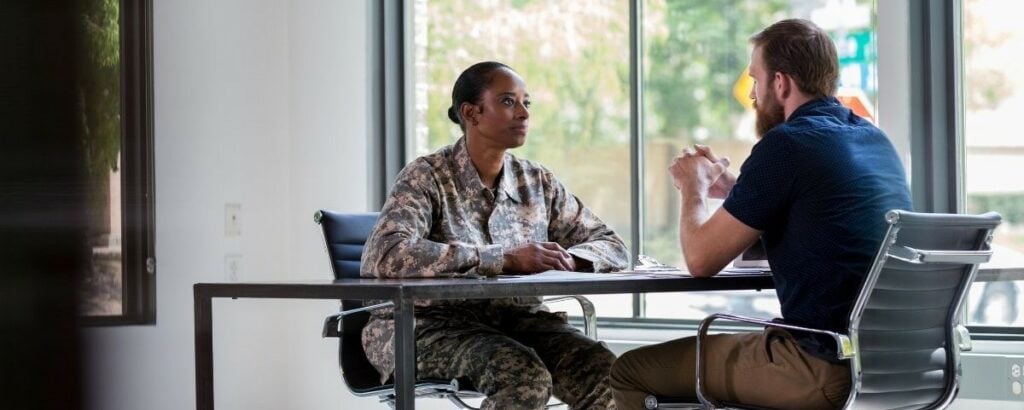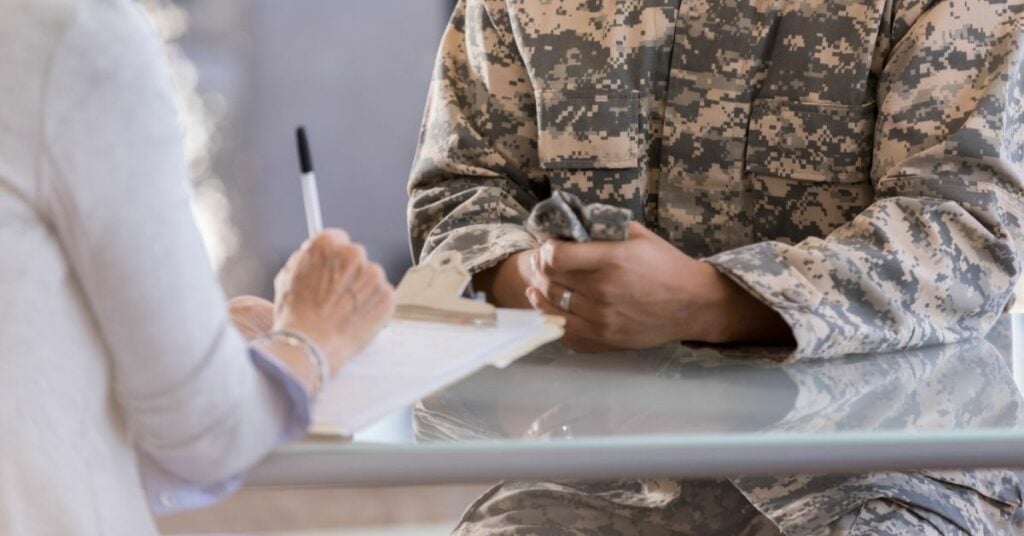Connecting with veterans at the holidays


Please be advised that this article mentions suicide. If you’re in crisis, help is available now: Call or text the free, confidential 988 Lifeline at 988.


The holiday season is often a time for family gatherings and closeness with those you love. But for some veterans and service members, the holidays can be difficult to navigate. Whether you have someone in your life who has served or is currently serving, building a meaningful connection with them is an important step in supporting their mental health.
We sat down with military veteran and psychologist Justin Baker, PhD, to talk about how families and communities can help forge these essential connections.
Amye Archer: What are some thoughtful ways that civilians can recognize a returning or former service member without triggering difficult memories or making them uncomfortable?
Justin Baker: It’s important we remember that veterans aren’t that different than civilians. We were civilians before we were veterans. So however you typically greet your loved one doesn’t need to change. I suggest reading the room and following the veteran’s or service member’s lead. You can start casual: “Hey, how’s it going? Good to have you back.” Don’t ever ask questions like “How is combat?” or “Did you shoot anybody?” You just never know what experience that person had, so it’s important to read signals and let the veteran disclose or not disclose what they’re comfortable with.
What are the biggest shifts you’ve seen in how veterans are talking about their military service?
I think it’s important to say that veterans, by and large, transition well and are really proud of their service. There are more success stories than the stories we focus on, which are the veterans struggling with suicide or PTSD. Percentage-wise, the majority do exactly what they wanted to do by joining the military, which is to get a step up in life by earning college benefits or advanced career opportunities or connections.
That being said, in today’s environment, for those who are struggling, it’s become more okay to be not okay. That’s significant because the sooner someone can identify that they’re not okay and get help, we save a lot of heartache and stress and anxiety. We have good treatments for suicide and PTSD (including through our STRIVE program at Ohio State) and depression and anxiety—common problems that military personnel experience—so I think it’s a good culture shift.
Tell us about your research with Caring Contacts.1 What are some ways that veterans benefit from feeling connected to others?
Jerome Motto, a psychiatrist who served in World War II, came up with the concept. While serving, he got these letters from his hometown. He didn’t know who they were from. They were messages like “We’re thinking about you” and “We support you,” and that was enough to carry him through.
Fast-forward almost three decades, and he applies that same concept to people showing signs of suicidality who were not seeking help. Motto used letters and postcards to send caring, non-demanding messages like “Thinking of you today,” typically handwritten. There was nothing expected in return, and it showed a decrease in suicide.2 It is one of the few interventions to show a decrease and several studies have since replicated that result, including one that I was on.
My study with the Marine Corps involved text messaging, adapting to new modalities of communication.3 It did have a positive effect on the Marines. I’m not sure a text message carries the same level of intimacy that a handwritten postcard does, so we didn’t see as big of an effect as that original study, but it’s certainly an easy thing to implement so they know that they’re not alone.
How can families, friends, and communities around veterans help build connections?
Reaching out and saying “Thinking of you,” “Hope you’re doing well,” or “Miss you this Christmas” can be meaningful, especially for people who are more isolated. If they’re deployed and they can’t make it home for the holidays, it’s going to have a much larger impact for those individuals than people who have community and support.
The messages will be more effective if you expect nothing in return. Also personalize your message as much as possible, especially if you know the person you’re reaching out to. There must be some cost on your side, right? That’s why I think the postcards or letters carry a little bit more intentionality behind them and have a little bit larger effect. Start with a weekly message and maybe go to monthly; don’t overwhelm someone. Remembering birthdays and holidays is also important.
What about veterans who may be feeling isolated at this time of year? How might they seek out connections?
One of the most common things I hear from the veterans I’m treating is the worry they will be a burden. They don’t want to bother a friend with their problems. I typically respond to them with a question like, “What would you do if your friend reached out to you and they were in a similar circumstance? What would your first thought be?” Of course, it would be to help.
What ends up happening is the person you reach out to feels honored instead of bothered. They feel honored to be trusted with this information and glad they’re able to help. I would encourage anyone reading this to know that reaching out doesn’t typically elicit a burdensome response—it tends to bring people closer together. And they can still support you without having lived in your shoes.
How to give and get support
If you’d like to help support service members by writing to them, a number of organizations would welcome your time and energy, including:
If you’re a veteran or service member who’s struggling or know someone who is, help is available 24/7 from the Veterans Crisis Line: Call 988 and press 1, or text 838255.
To find a mental health professional near you for ongoing support, visit our therapist directory.

Sources
About the author
Amye Archer, MFA, is the author of “Fat Girl, Skinny” and the coeditor of “If I Don’t Make It, I Love You: Survivors in the Aftermath of School Shootings,” and her work has appeared in Creative Nonfiction magazine, Longreads, Brevity, and more. Her podcast, “Gen X, This Is Why,” reexamines media from the ’70s and ’80s. She holds a Master of Fine Arts in creative nonfiction and lives with her husband, twin daughters, and various pets in Pennsylvania.
Related articles

Veterans face a greater risk of mental health issues such as PTSD, but...

At Give an Hour, therapists extend their reach to veterans in need
Since its founding in 2005, the Give an Hour organization has created a...

What is posttraumatic stress disorder (PTSD)?
PTSD can develop after a person experiences or witnesses trauma. Find out how...
